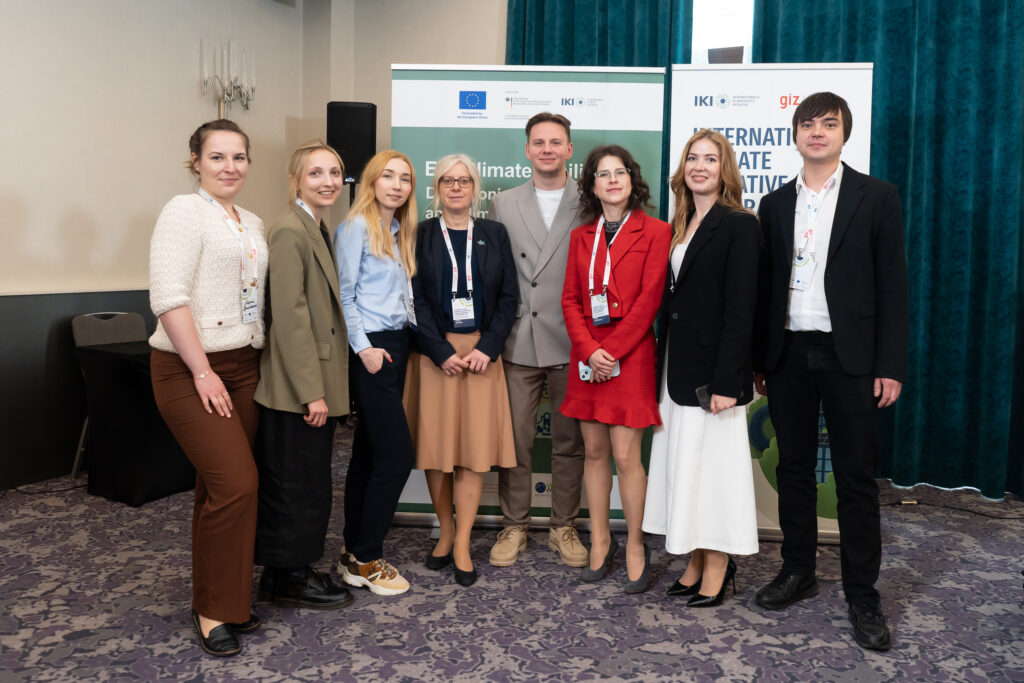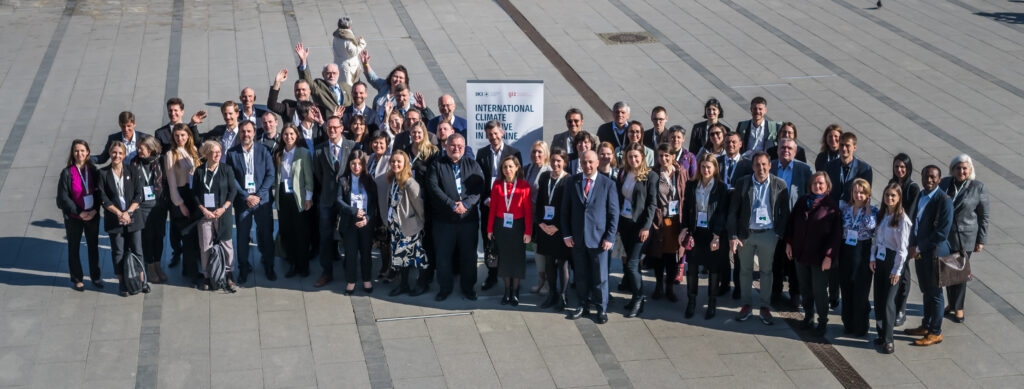On May 27, a high-level discussion took place in Kyiv on Ukraine’s updated Nationally Determined Contribution (NDC) until 2035. The event was organized by the Ministry of Environmental Protection and Natural Resources of Ukraine with the support of the IKI Interface and EU4ClimateResilience projects, implemented by Deutsche Gesellschaft für Internationale Zusammenarbeit (GIZ) GmbH as part of the International Climate Initiative (IKI).
The event brought together over 190 participants, including representatives of ministries, businesses, civil society, and international partners, to discuss the draft of Ukraine’s new NDC.
The new NDC represents a crucial climate commitment by Ukraine under the Paris Agreement. It will not only outline updated greenhouse gas emissions reduction targets but also define the pathways to achieving sustainable recovery amid wartime conditions. It is a comprehensive document that spans actions in energy, industry, agriculture, forestry, and waste management.
As it develops the NDC 2035 scenarios, Ukraine seeks to ensure an inclusive dialogue involving all relevant stakeholders. This event served as an open platform for such a dialogue, enabling participants to exchange views on key issues such as:
- Modeled scenarios for decarbonization and sustainable economic development;
- The impact of the war on climate policy, the economy, and the environment;
- Financial instruments to support the green transformation.
Speakers included Jan Dusik, Deputy Director-General of the European Commission’s Directorate-General for Climate Action (DG CLIMA); Dr. Philipp Behrens, Head of Division at the German Federal Ministry for Economic Affairs and Climate Action (BMWK); Olga Yukhymchuk, Deputy Minister of Environmental Protection and Natural Resources of Ukraine; and Roman Andarak, Deputy Minister of Energy of Ukraine.
Jan Dusik praised Ukrainians’ resilience and commitment to climate action despite Russia’s ongoing aggression. He also emphasized that the NDC is a crucial benchmark for Ukraine’s EU accession path and outlined the characteristics the climate commitment should embody:
The upcoming NDC is also a critical test for Ukraine’s ambition to join the European Union and implement a genuine green reconstruction. Of course, the target needs to be achievable and realistic, taking into account the harsh economic and demographic circumstances that are currently affecting Ukraine’s economy and society. On the other hand, the target needs to fully factor in the notion of green reconstruction and to really get to the ambition and the potential that we believe is very significant for Ukraine to thrive in a carbon-less world.
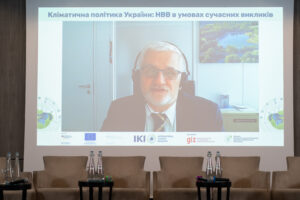
Dr. Philipp Behrens highlighted Ukraine’s ongoing climate efforts to align its policies with those of the European Union, despite the war. He also stressed that the NDC is not only a climate commitment but also a powerful investment tool:
An ambitious NDC — which of course should be well aligned with a long-term low-carbon development strategy and the goal of climate neutrality by mid-century — is not only guiding national policies, but it can also serve as a reference for public and private investment decisions. Therefore, the development of Ukraine’s new NDC is not only a climate commitment, but also a strategic opportunity to align post-war recovery with sustainable development and energy security, as well as the European integration process.
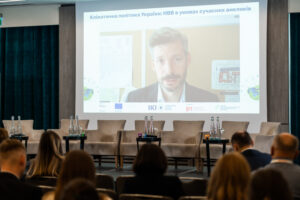
Olga Yukhymchuk emphasized the EU integration dimension of Ukraine’s climate policy and the importance of aligning the NDC with European priorities:
All our climate goals must correspond to Ukraine’s path toward EU membership. By 2035, we envision Ukraine as part of the European Union. Therefore, the measures we plan to achieve under the NDC must be synchronized with EU climate policy. We must demonstrate to the world that even in wartime, Ukraine remains a responsible actor and fulfills its obligations.
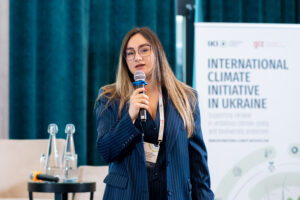
Gabriel Sauer, Director of the IKI Interface project, which supported the event, noted the inclusivity of the NDC development process and stressed the importance of balancing ambition with realism:
“Ukraine is demonstrating transparency and openness in shaping its climate policy, even under wartime conditions. Engaging a wide range of stakeholders not only enhances the legitimacy of the new NDC but also ensures better consideration of complex economic and energy realities. At the same time, it’s crucial to maintain a balance between ambitious goals and the realistic means to achieve them — this will determine both the outcomes and the trust of international partners and Ukrainian society.”
The event served as a platform for open and inclusive dialogue among all stakeholders. All participants emphasized the importance of cross-sectoral cooperation among government, business, civil society, and international partners.
Looking ahead, the Ministry of Environmental Protection and Natural Resources of Ukraine plans to continue discussions on the draft NDC — first through sector-specific expert meetings, followed by a final broad stakeholder consultation before the NDC is officially adopted.
The event is organized at the initiative of the Ministry of Environmental Protection and Natural Resources of Ukraine with the support of the IKI Interface project and EU4ClimateResilience (co-founded by European Union), implemented by Deutsche Gesellschaft für Internationale Zusammenarbeit (GIZ) GmbH on behalf of the Federal Ministry for Economic Affairs and Energy and the Federal Ministry for the Environment, Climate Action, Nature Conservation and Nuclear Safety within the framework of the International Climate Initiative (IKI).
